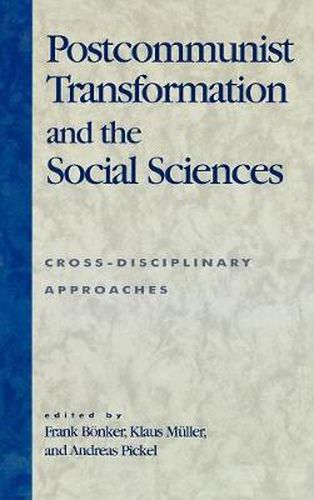Readings Newsletter
Become a Readings Member to make your shopping experience even easier.
Sign in or sign up for free!
You’re not far away from qualifying for FREE standard shipping within Australia
You’ve qualified for FREE standard shipping within Australia
The cart is loading…






This book is a methodologically self-conscious and intellectually ambitious effort to advance the social science debate on postcommunist transformation beyond the limitations of its first decade. Offering theoretically innovative and empirically current analyses of fundamental economic, cultural, and political problems of systemic change and reform in central and Eastern Europe, the authors broaden and deepen the research agenda by developing a set of interrelated approaches that are cross-disciplinary, sociologically informed, historically comparative, and global. The book’s major substantive themes revolve around problems of postcommunist socioeconomic transformations. Specifically, the book explores postcommunist systemic change, the role of religion and collective identity, the significance of trust and economic culture, patterns of state-economy interactions in enterprise restructuring, the context of EU expansion, the strengths and weaknesses of economic theory and neoliberal doctrine, and the history of ideas in the postcommunist transformation debate. Bringing together leading experts in the field to illustrate the fruitfulness of multidisciplinary analysis in understanding socioeconomic transitions, this work will be valuable for economists, sociologists, and political scientists alike.
$9.00 standard shipping within Australia
FREE standard shipping within Australia for orders over $100.00
Express & International shipping calculated at checkout
This book is a methodologically self-conscious and intellectually ambitious effort to advance the social science debate on postcommunist transformation beyond the limitations of its first decade. Offering theoretically innovative and empirically current analyses of fundamental economic, cultural, and political problems of systemic change and reform in central and Eastern Europe, the authors broaden and deepen the research agenda by developing a set of interrelated approaches that are cross-disciplinary, sociologically informed, historically comparative, and global. The book’s major substantive themes revolve around problems of postcommunist socioeconomic transformations. Specifically, the book explores postcommunist systemic change, the role of religion and collective identity, the significance of trust and economic culture, patterns of state-economy interactions in enterprise restructuring, the context of EU expansion, the strengths and weaknesses of economic theory and neoliberal doctrine, and the history of ideas in the postcommunist transformation debate. Bringing together leading experts in the field to illustrate the fruitfulness of multidisciplinary analysis in understanding socioeconomic transitions, this work will be valuable for economists, sociologists, and political scientists alike.